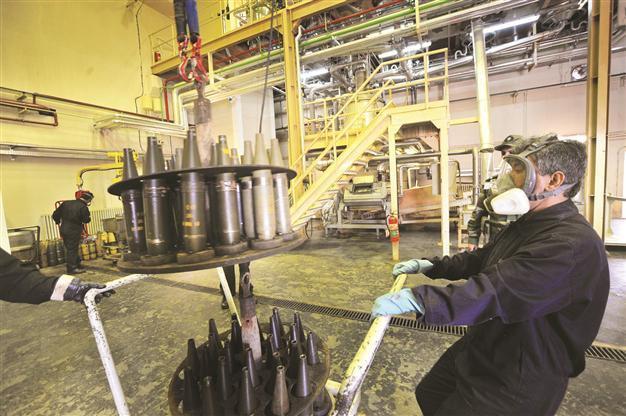Is Turkey planning to bypass global ammunition regime?
BURAK BEKDİL

Hürriyet Photo
Western diplomats and military officials remain puzzled over remarks by a Turkish minister that Turkey is set out to produce unspecified types of ammunition and thus circumvent foreign suppliers’ potential sales blockades.In a recent speech, Science, Industry and Technology Minister Fikri Işık said Turkey would launch a “national” factory this year to produce its own “warheads, airplane bombs and plastic explosives.”
He said the new factory would end Turkey’s dependence on foreign suppliers of this type of ammunition.
The proposed production facility would be located adjacent to another ammunition factory operated by state-controlled weapons manufacturer MKE in the Central Anatolian province of Kırıkkale. It will produce 600 tons of plastic explosives, Işık said.
“The special production equipment used in ammunition factories are subject to the Missile Technology Control Regime (MTCR) and buyers need permission from the producing countries to obtain these materials,” Işık said. “According to the international treaties Turkey is a signatory to, we have had to obtain export licenses from the supplier company’s country to meet our requirements for warheads and bombs. And we failed to meet our needs if the country in question did not allow its manufacturer. We aim to end this [problem] by producing [those items] ourselves.”
“The minister’s statement is not clear for many reasons. We are trying to understand if Turkey is planning to bypass the MTCR. If so, that would be worrying,” said one NATO defense attaché in Ankara.
Another NATO ambassador in Brussels expressed worry in a telephone interview. “We are not sure what kind of ammunition Turkey intends to produce at this new factory, and why it hopes to bypass the MTCR,” the envoy said.
“I understand Turkey is planning to produce the kind of warheads it did not produce before,” a London-based Turkey specialist said. “The MTCR is about the vehicle [missile], its range and the quantity of explosives it carries. The minister’s words can be interpreted in a way that Turkey may be targeting to exceed the limits specified in the treaty. This can be problematic for many countries.”
The MTCR is an informal and voluntary association of countries which share the goals of non-proliferation of unmanned delivery systems capable of delivering weapons of mass destruction, and which seek to coordinate national export licensing efforts aimed at preventing their proliferation.
The MTCR was originally established in 1987 by Canada, France, Germany, Italy, Japan, the United Kingdom and the United States. Since that time, the number of MTCR partners has increased to a total of 34 countries, all of which have equal standing within the regime. Turkey is a signatory to the treaty.
The MTCR rests on adherence to common export policy guidelines (the MTCR Guidelines) applied to an integral common list of controlled items (the MTCR Equipment, Software and Technology Annex). All MTCR decisions are taken by consensus, and MTCR partners regularly exchange information about relevant national export licensing issues.
National export licensing measures on these technologies make the task of countries seeking to achieve capability to acquire and produce unmanned means of WMD delivery much more difficult. As a result, many countries, including all MTCR partners, have chosen voluntarily to introduce export licensing measures on rocket and other unmanned air vehicle delivery systems or related equipment, material and technology.
















